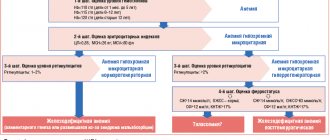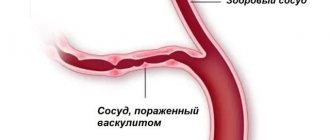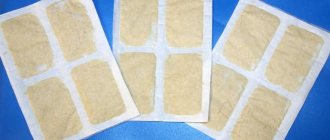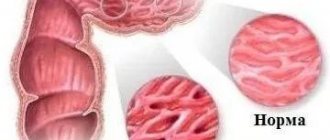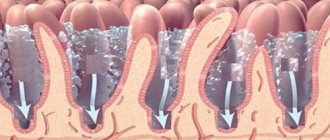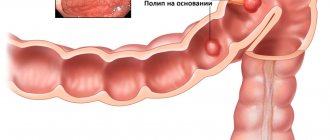Author, editor and medical expert - Klimovich Elina Valerievna.
Number of views: 346 525
Last updated: 10/29/2021
Average reading time: 16 minutes
Probably, most of us at least once during our lives experience constipation caused by dietary errors and bowel dysfunction. However, for some, long “get-togethers” in the toilet become commonplace. Presumably, chronic constipation affects up to 50% of Russians of all ages: from infants to the elderly1. We will talk about the causes of bowel dysfunction and ways to normalize it in this article.
Symptoms and signs
Chronic constipation (constipation) is understood as constantly slow, difficult and systematically insufficient bowel movement, accompanied by abdominal discomfort and a disturbance in the general condition1,2.
Signs of constipation:
- stool retention for more than 48 hours;
- reduction in stool volume to 35 g per day;
- dense, dry, fragmented feces, traumatic to the anus;
- a feeling of incomplete emptying or “blockage” of the rectum;
- the need for prolonged pushing, taking more than a quarter of the time from the moment the urge to defecate occurs until feces are released.
The presence of two of the six listed signs indicates stool retention1. Chronic constipation is said to occur if difficulties occur with every fourth visit to the toilet for a total of more than 3 months over a six-month period2.
Many are sure that bowel movements should be daily, and their absence is regarded as a problem. However, some people, due to the characteristics of their body, go to the toilet “largely” once every 2 days and do not experience any inconvenience1.
Constipation always causes discomfort. Symptoms that may accompany frequent constipation1::
- bloating and heaviness in the abdomen;
- nausea and belching;
- dullness, pallor and yellowish-brown skin tone;
- decreased skin turgor (flabbiness);
- the appearance of dermatological diseases: eczema, pyoderma, urticaria, acne.
Up to contents
Causes of chronic constipation
Systematically difficult defecation can be caused by a variety of reasons that disrupt the normal functioning of the intestines and the process of excretion of feces1.
- Peristalsis plays a major role in normal intestinal function. To activate it, it is necessary that the intestinal contents be sufficient in volume1: a decrease in the amount of feces leads to a slowdown in motility and constipation.
- Compaction of feces associated with insufficient intake of water into the body and its active absorption in the intestines.
- Difficulty moving stool through the intestine may also be due to:
- damage to her muscular system;
- problems of the nervous system involved in the formation of peristaltic waves;
- disruptions in the endocrine regulation of the gastrointestinal tract;
- “damage” to the defecation reflex that occurs when the rectum is filled;
- mismatch in the functioning of the pelvic floor muscles, in particular the anal sphincters, which regulate feces1.
The above-described disorders occur with various types of chronic constipation.
Depending on the causes of constipation, there are 1:
- Nutritional (simple) problems associated with nutritional errors, non-compliance with the water regime and a sedentary lifestyle.
- Habitual, arising due to the bad habit of delaying bowel movements or the inability to go to the toilet when the urge occurs.
- Metabolic and endocrine , which occur against the background of hypothyroidism, diabetes mellitus, pregnancy, pheochromocytoma, as well as disorders of potassium and calcium metabolism and are accompanied by a decrease in the level of these microelements in the blood.
- Medicinal , developing as a side effect of drugs, for example, antispasmodics, anticonvulsants, antihistamines, non-steroidal anti-inflammatory drugs, antidepressants.
- Neurogenic, caused by diseases of the central and peripheral nervous system: multiple sclerosis, deterioration of cerebral circulation, Parkinson's and Alzheimer's disease, spinal damage.
- Psychogenic caused by chronic stress, hypochondria and depression, schizophrenia, anorexia nervosa.
- Associated with systemic diseases (scleroderma), diseases of internal organs (cholecystitis, pancreatitis), “congestion” in heart, kidney and liver failure.
- Provoked by diseases of the colon : inflammatory, non-inflammatory, tumor, including cancer.
- Caused by problems of the rectum and pelvic floor: tumors, weakening of the pelvic floor muscles, prolapse of the pelvic organs, etc.1,4
Up to contents
Most common constipation
Most often, alimentary simple and habitual variants of constipation occur, as well as irritable bowel syndrome (IBS), the development of which is explained primarily by psychological reasons1,2.
Nutritional
This type of constipation is associated with slow movement of food through the gastrointestinal tract as a result of a number of factors. These include:
- A sharp decrease in the amount of food consumed when following a diet, lack of appetite, the presence of contraindications and obstacles to proper nutrition, for example, after surgery, in the absence of teeth1.
- Insufficient fluid intake, which causes dehydration and a decrease in the volume of intestinal contents1.
- Excessive enthusiasm for products that “fix” stool3 due to their crushed composition, low fiber content, and the presence of astringents and diuretics. This group includes strong broths, pureed soups and porridges, jelly, puddings, pear, blueberry, quince compotes, strong tea and coffee3.
A sedentary lifestyle also contributes to the development of nutritional constipation1. Difficulty in defecation occurs due to decreased motility and is not accompanied by structural changes in the intestine characteristic of diseases. Normalizing nutrition and increasing physical activity, as a rule, helps normalize stool1,2.
Habitual
Constant constipation in adults and children is often the result of the habit of holding back bowel movements.
The best time to visit the toilet “in a big way” is considered to be morning1,3. The beginning of physical activity and eating during breakfast reflexively enhance intestinal motility and facilitate bowel movements. If in the morning rush you postpone going to the toilet over and over again, feces stretch the rectum, and its receptors stop responding to irritation - the reflex to defecation becomes weakly expressed. As a result, habitual constipation arises.
Habitual, constant constipation is experienced by people who deliberately delay going to the toilet when the urge arises. This happens when a person is demanding about the sanitary conditions of public places and cannot go to the toilet while at work or school1.
Often problems with excretion of feces occur in people who do not have the ability to immediately satisfy a natural need when necessary, for example, public transport drivers, teachers, assembly line workers, judges, surgeons1.
Often the cause of unconscious delay in bowel movement is fear of defecation due to regularly occurring pain syndrome in the presence of hemorrhoids, chronic anal fissure, inflammatory diseases and rectal cancer1. Treatment of these diseases helps solve the problem of constipation.
Psychogenic
One variant of this group of disorders is irritable bowel syndrome (IBS)1. It is believed that the basis for the development of the disease is problems in the psycho-emotional sphere1. The imbalance of hormones that occurs against the background of nervous overload and chronic stress leads to changes in intestinal motility, and nutritional problems and a sedentary lifestyle aggravate the situation1. A distinctive feature of constipation in IBS is the appearance of abdominal pain, which goes away immediately after the passage of feces; a combination of bowel movements with migraines, insomnia at night and drowsiness during the day, sudden hot flashes and rapid heartbeat, painful menstruation and other symptoms arising from malfunctions of the nervous system. These manifestations also help distinguish IBS from habitual constipation1.
Up to contents
Chronic constipation in children
Chronic bowel retention affects not only adults, but also children. True, the concept of normal bowel movement in this case is unclear. In newborns and infants in the first months of life, feces can be excreted after each feeding, that is, up to seven times a day, and with artificial feeding - once a day3. The absence of stool for 36 hours can already be considered constipation3. For children over 3 years old this period is 48 hours3.
Constipation in children is in most cases limited to functional impairments3. Currently, the main reason for irregular rectal emptying in children of the first year of life is considered to be the immaturity of the child’s digestive and nervous system4. A difficult pregnancy for the mother, premature birth, cesarean section - all this sometimes leads to delays in the development of the baby3.
Among the nutritional causes of constipation are refusal to breastfeed, incorrect choice of formula for artificial feeding and complementary feeding, and insufficient fluid intake3.
In older children, habitual constipation is especially common, associated with ignoring breakfast, suppressing the morning natural urge due to haste, deliberate retention of stool caused by shyness and refusal to visit the public toilet in kindergarten and school3.
“Children’s” constipation is predominantly accompanied by increased peristalsis and discoordination of intestinal motor activity, leading to spasms, so treatment should be aimed at relaxing the intestinal muscles3.
For persistent problems with rectal emptying in children, in addition to recommendations for dietary changes, doctors prescribe antispasmodic drugs and procedures, as well as medications that normalize the functioning of the nervous system and prebiotics3. In this case, laxatives that stimulate intestinal motility and inhibit the absorption of water and salts in the gastrointestinal tract are not used3.
Up to contents
Diagnosis and treatment of constipation at the EXPERT Clinic
What and how can we help you?
- Consult with a competent specialist - our gastroenterologist will examine you in detail, if necessary, prescribe additional consultations with related specialists and monitor the treatment process, from the first visit to the result.
- To identify the cause of constipation - we have all the necessary expert-class equipment and highly qualified diagnostic specialists to conduct a detailed examination - tests, ultrasound, endoscopic examinations.
- Save you time and money - to find out why your intestines are refusing to work regularly, we have created a free conversation with a gastroenterologist to schedule an examination. If you are concerned about your symptoms, but you don’t know where to start, during the conversation you will be prescribed the necessary range of tests.
Chronic constipation in older people
Elderly people, like children, are a special category of patients who turn to gastroenterologists with chronic constipation. According to statistics, in older people, stool retention occurs 5 times more often than in young people4, and they are associated mainly with reduced intestinal tone and slower peristalsis4.
The following factors predispose to regular bowel problems4:
- Dietary features, in particular, reducing the amount of food and rarely consuming coarse foods - due to problems with teeth and stomach, crushed refined foods, low in fiber, begin to predominate in the diet.
- Decreased physical activity due to muscle weakness, diseases of the musculoskeletal system and cardiovascular system.
- Weakening of the muscles of the anterior abdominal wall and pelvic floor due to a general age-related decrease in muscle volume and loss of muscle tone4.
- Reduced intestinal motility due to age.
- Slowing of digestion due to decreased activity of digestive enzymes and changes in the composition of intestinal microflora4.
- Taking a large number of medications, some of which cause problems with stool4.
- Abuse of addictive laxatives4.
The danger of chronic constipation in older patients is the high risk of fecal stone formation. Prolonged presence of feces in the intestines and their pressure on the intestinal wall can cause the formation of fecal ulcers and the development of cancer4. According to statistics, the risk of colorectal cancer in the presence of constipation is 1.48-2 times higher than in people without constipation4.
In old age, the so-called “alarming symptoms” require special attention:
- changes in the thickness and shape of stool,
- progression of bowel problems
- the appearance of diarrhea after prolonged retention of stool,
- the presence of blood in the stool,
- pale skin caused by anemia,
- general weakness and weight loss.
The appearance of the above symptoms over the age of 50 is a reason to immediately contact a doctor.
Up to contents
Diagnostics
To diagnose constipation, the doctor collects the patient’s complaints, examines him and prescribes laboratory research methods: general blood and urine tests.
In addition, irrigoscopy (x-ray examination of the intestines) and colonoscopy (examination of the intestines with an endoscope) are indicated. Irrigoscopy and colonoscopy make it possible to determine how the intestines function, whether there are tumors, scars, or areas of inflammation or ulceration.
In some cases, consultations with a neurologist and endocrinologist are indicated.
The sections on the diagnosis and treatment of constipation are based on the Federal Clinical Guidelines for 2013.
What to do if you have constant constipation
First of all, you need to contact a gastroenterologist and undergo an examination that will allow you to determine the causes of the disorders. Taking into account the results, the doctor will prescribe treatment, which in any case will include the following measures.
Nutrition correction.
When constipation is accompanied by weakened intestinal motility, it is useful to include in the diet foods rich in coarse fiber: raw vegetables and fruits (at least 200 g per day), crumbly porridge (oatmeal, buckwheat, pearl barley, millet, bulgur and others) and whole grain bread , flaxseed and bran, prunes and dried apricots, fermented milk products, vegetable fats and meat containing ligaments and tendons1,3,4.
If constipation is accompanied by decreased intestinal motility, doctors advise carefully increasing the fiber content in the diet over 5-7 days1.
To prevent dehydration and hardening of stool, it is recommended to consume at least 1.5-2 liters of fluid per day1,4.
It is important to follow a diet: be sure to have a hearty breakfast and eat at least 3-4 times a day3.
Increased physical activity
In order to stimulate intestinal function, therapeutic exercises, yoga, swimming, long walks, and physical education are recommended.
Abdominal massage2 and special exercises for the abdominal muscles3, which involve alternating tension and relaxation, will help mechanically strengthen motor skills.3.
For infants with difficulty defecating, it is recommended to have a special abdominal massage after eating,3,4.
Development of a conditioned reflex
With the usual variants of constipation, it is important to develop a morning reflex to defecation. To do this, it is recommended to get up a little earlier to avoid the morning rush, have breakfast and then empty the rectum in a calm atmosphere. A traditional morning visit to the toilet helps develop a healthy habit.
In turn, children need to be put out on the potty at the same time of day and always in the morning after breakfast. At the same time, it is important that the potty is warm, comfortable, and that the process itself is not accompanied by requests to “do everything faster.”
Laxatives
For chronic constipation, various laxatives are used to empty the bowel:
- osmotic, retain water in the intestinal lumen, helping to soften stool2;
- stimulating, irritate the receptors of the intestinal mucosa and increase peristalsis;
- local, which soften stool in the rectum2.
However, frequent use of stimulants carries a high risk of side effects, particularly diarrhea and addiction2.
MICROLAX® is a combined laxative based on sodium citrate, sodium lauryl sulfoacetate and sorbitol5. Acting at the level of the rectum, the drug components displace bound water from the intestinal contents, attract it into the intestinal lumen, soften stool and promote defecation5.
The drug MICROLAX® is available in the form of a microenema, equipped with a special tip for easy insertion into the rectum5. The effect may occur within 5-15 minutes5. The high safety profile allows the drug to be used for the treatment of constipation in adults and children5.
Up to contents
The information in this article is for reference only and does not replace professional advice from a doctor. To make a diagnosis and prescribe treatment, consult a qualified specialist.
Treatment
Treatment of constipation involves correction of diet and lifestyle, as well as the use of folk remedies and medications. If constipation develops against the background of another disease, then treatment should be aimed at eliminating the causative pathology. In severe cases, treatment of constipation includes surgery (for example, in case of acute intestinal obstruction).
What to do if you are constipated
Photo: pvproductions / freepik.com
If you have constipation, your doctor usually recommends reconsidering your eating habits. Here are some tips to follow when treating constipation:
- Eat more dietary fiber (fiber). They are found in vegetables, fruits, legumes and whole grain bread.
- Move more. Try to spend more time on physical activity. Regular walking at a medium or fast pace will be helpful. This speeds up intestinal motility and promotes freer movement of feces.
- Drink more fluids.
- Don't be patient. If you feel the urge to defecate, go to the toilet immediately. If you often ignore the urge to defecate, over time these signals weaken, which leads to bowel dysfunction.
- Less stress. It is better to avoid stress, since constipation often occurs against the background of emotional experiences.
Medicines
If correction of diet and lifestyle is not enough to get rid of constipation, then in this case the person is prescribed medications that accelerate the evacuation of feces and relieve the unpleasant symptoms that accompany constipation. These medications include:
- Secretory laxatives - have an irritating effect on intestinal receptors.
- Bulk laxatives – increase the volume of stool by absorbing water, thereby speeding up the passage of stool.
- Osmotic laxatives are drugs that increase the osmotic pressure in the intestines, which promotes the flow of water.
- Emollients – soften stool, speeding up its elimination from the intestines. Unlike stimulants, emollients act more slowly.
- Probiotics are preparations containing live cultures of beneficial bacteria. These medications can help with dysbiosis.
Photo: modesto3 / Depositphotos
Home Remedies
The following home remedies can help relieve constipation:
- A glass of water on an empty stomach has a stimulating effect on the intestines.
- Dried fruits have a laxative effect. Prepare a puree from pre-soaked dried fruits (dried apricots, prunes, raisins, figs and dates) and honey. Take morning and evening instead of dessert.
- Cucumbers, plums and beets – eat more of these vegetables and fruits as they have a laxative effect.
- Morning coffee has a stimulating effect on the intestinal mucosa, stimulating peristalsis.
ethnoscience
Humanity encountered constipation long before the advent of pharmacological agents. There are several more or less effective remedies, but before using them it is best to consult a doctor. There are four such means:
- Herbs with a laxative and stimulating effect - senna leaves, dill seeds, plantain seeds, cumin.
- Vegetable oils - flaxseed, olive, castor, pumpkin, sea buckthorn and sesame.
- Bran – wheat, buckwheat, oat and others.
- Freshly prepared vegetable juices - potato, cucumber, beet, carrot and celery juice.
How to quickly get rid of constipation
It all depends on the cause and stage of constipation. If this is episodic constipation, then quick relief occurs with correction of nutrition and physical activity. In more complex cases, it is necessary to follow all the doctor’s recommendations. And remember that when taking medications for constipation, adjustments to your diet and lifestyle are necessary. Only an integrated approach will allow you to effectively cope with the problem.
